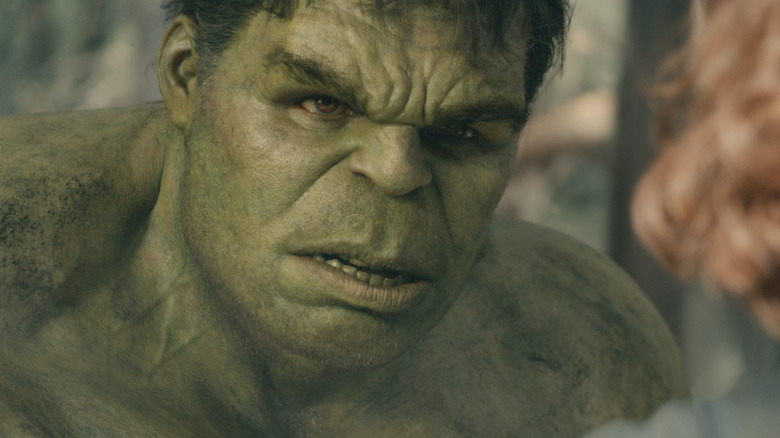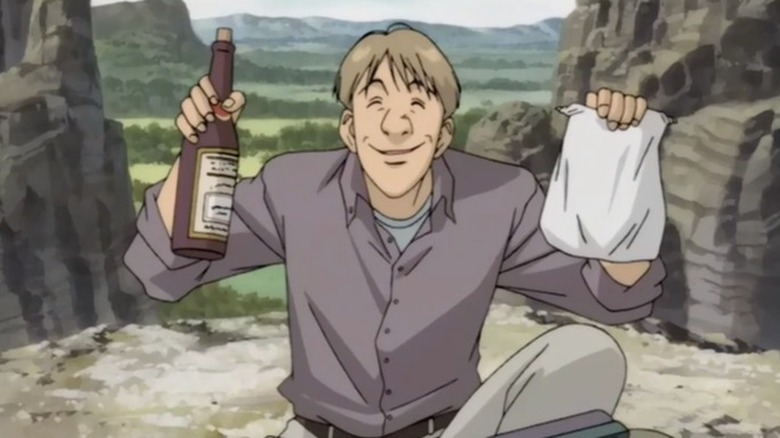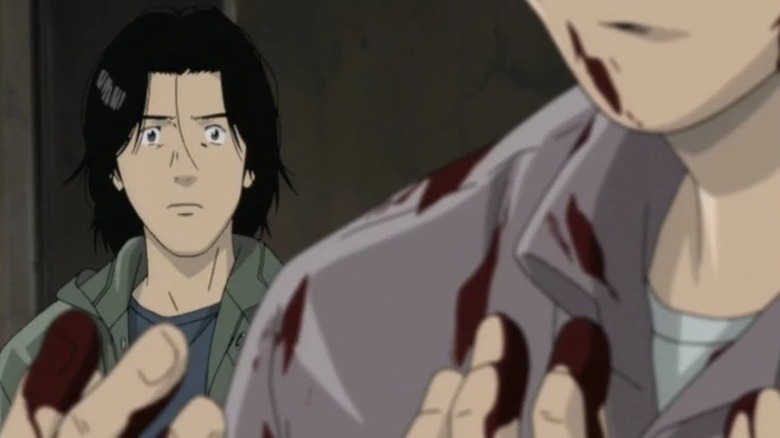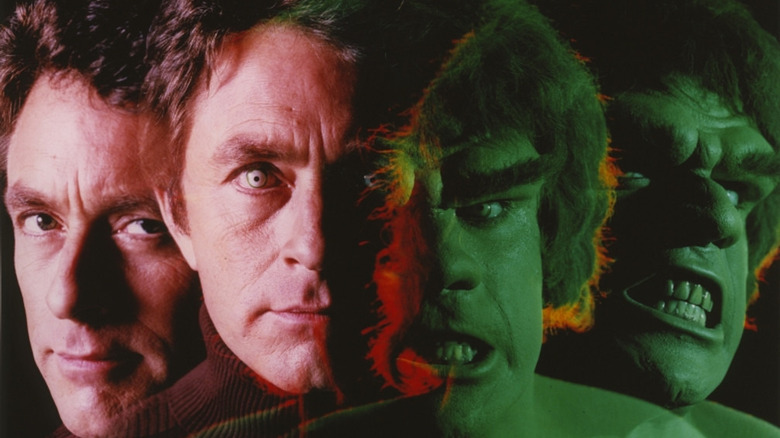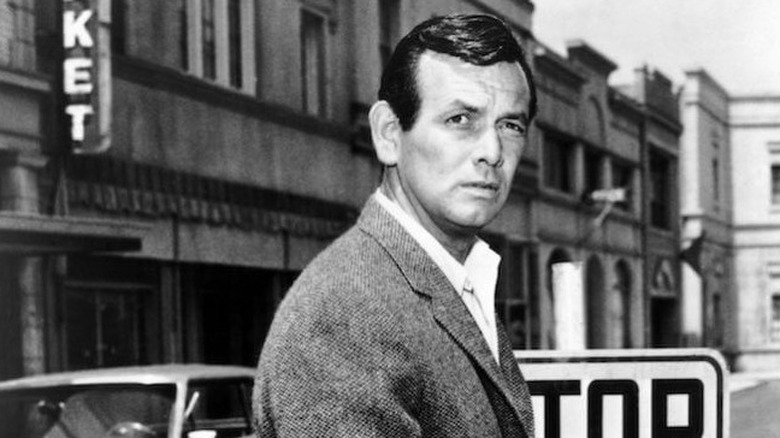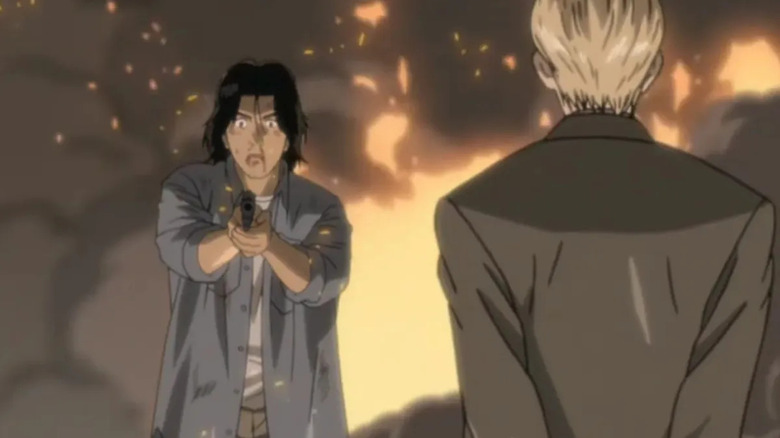One Classic Anime Has A Character Inspired By Marvel's The Hulk
The Marvel Cinematic Universe has made Bruce Banner/The Hulk into just one more of the Avengers. His most recent MCU appearances, "Avengers: Endgame" and "She-Hulk," have ditched the man and monster dichotomy altogether; the Hulk is now just a green and buff Bruce.
For all his personal faults, Joss Whedon was the last writer/director to explore the Hulk's tragedy in his two "Avengers" films. The nascent team's climactic argument in "The Avengers," when Banner silences the room by revealing he "got low, so he put a bullet in [his] mouth, and the other guy spit it out" has real dramatic gravitas.
However, the MCU has altogether elided where that tragedy begins. In the comics, Dr. Bruce Banner was already a troubled man before the gamma bomb explosion that changed his life. Banner's father Brian was a nuclear psychist convinced his own radiation exposure turned his son into a monster. Brian treated Bruce only with contempt, and when his wife Rebecca tried to protect her son, he murdered her.
Writer Peter David, during his long "Incredible Hulk" run, suggested that the Hulk is a product of Bruce's dissociative identity disorder, a protective shell created during his abusive childhood. Ang Lee's controversial 2003 "Hulk" film, which uses this backstory, is the film most faithful to Banner's tortured spirit.
For comics delving into Bruce's shattered mind, I'd recommend "Incredible Hulk" #312 (by Bill Mantlo and Mike Mignola), "Incredible Hulk" #377 (by David and Dale Keown), and Al Ewing's "Immortal Hulk" series.
The Hulk is a titan of popular culture, so his influence doesn't end with his own stories, either. "Monster" by Naoki Urasawa, a classic manga/anime, features a character crafted in the same spirit as the Hulk.
This Man, This Monster
Set in the reunified Germany of the 1990s, "Monster" is the story of Dr. Kenzo Tenma, a neurosurgeon who once made a horrible mistake. What did he do? He saved the life of Johan Liebert, a young boy shot in the head. But Johan was no ordinary boy. For one, he was the only survivor of 511 Kinderheim, an orphanage attempting to drain the empathy of its youthful wards. Nine years later, Johan is a serial killer and Tenma follows him across Europe to slay the beast he returned to life.
Halfway through the series, Tenma (who's on a train to Prague searching for clues to Johan's past) meets Wolfgang Grimmer, a journalist with a toothless smile and unbreakable calm. Grimmer is genuinely friendly, even sharing an improvised meal with Tenma, but there's something off about him; he can't quite read people's emotions and his own are just as puzzling. At one point, he drops the bombshell that his son died without his lips curving even slightly down.
After parting ways with Tenma, Grimmer becomes the focal character for the next handful of chapters/episodes. It turns out he is also a product of 511 Kinderheim (though he was there years before Johan) and was a Soviet Union spy before the regime's fall. His childhood "training" left him unable to feel any emotion. He doesn't even know his birth name, either. Grimmer's only childhood memories are of watching his favorite TV show, "The Magnificent Steiner."
As Grimmer remembers, the show was a cartoon about a fragile man who, in times of stress, would turn into the super-strong "Magnificent Steiner" without knowing or remembering it. Sound familiar? Like Bruce Banner, Grimmer created an alter ego to bear the burdens of his traumatizing childhood — named for his TV hero.
The Magnificent Steiner
Johan models his acts on a picture book fairy tale, "The Nameless Monster," about a creature who devours the world while searching for a name. Grimmer basing himself on "Steiner" mirrors this, showing different responses to similar circumstances.
Though there are allusions beforehand, we first meet "Steiner" in "Monster" episode 46, "The Point of Contact." When Grimmer is surrounded by gunmen, the stress gets too much and Steiner takes over. We only see the aftermath, from the beaten corpses to Grimmer's bloody hands, when Tenma arrives on the scene.
"Monster" is set in a realistic world (down to its naturalistic art style), so Grimmer's "transformation" isn't physical like the Hulk's or the cartoon Magnificent Steiner (who is shown as a purple-skinned strong man in the anime). Still, both the Hulk mythos and Grimmer's arc are stories of men burdened with terrible pasts and trying their best to control their pain and be good despite it. In episode 49, "The Cruelest Thing," Grimmer and Tenma save Milosh, a child whom Johan was grooming into the nihilism of 511 Kinderheim. In Urasawa's world, the worst sin is purposefully destroying children's innocence. Grimmer can't give that back, but he still convinces Milosh that the world is better with him in it. As Grimmer cries, you feel as if he's finally shedding the tears for his dead son he'd long wanted.
Grimmer's journey of rediscovering his humanity tragically ends with his death in episode 71, "The Magnificent Steiner's Rage." He muses that he couldn't remember how the show ended, but concludes that Steiner probably became human again — he's not just talking about the cartoon.
As for why "The Magnificent Steiner" is, in-universe, a TV show? It might have something to do with the Hulk being a TV star in the 1970s.
Television's The Incredible Hulk
In 1977, Kenneth Johnson developed "The Incredible Hulk," a TV series that kicked off with a pilot movie and ran five seasons until 1982. The show starred Bill Bixby as Dr. David Banner and Lou Ferrigno as the Hulk.
"The Incredible Hulk" distanced itself from the comics as much as possible, but that wasn't necessarily a drawback. The concept of the Hulk fits easily as pure science fiction, not just as a superhero tale; it's basically "The Strange Case of Dr. Jekyll and Mr. Hyde" for the atomic age. Thus, the Hulk was more palatable for an adaptation in a world where superheroes were still niche. At the same time, though, the Hulk TV series elevated the character's fame; before the movies, it was through the show that people best knew the character.
The structure of "The Incredible Hulk" owes a lot to "The Fugitive" — before the 1993 Harrison Ford movie, "The Fugitive" was a TV show, running four seasons from 1963-1967. In each episode, Dr. Richard Kimble (David Janssen), hunting the one-armed man who killed his wife, arrives in a new town under an alias, gets involved with the locals, and leaves with Inspector Gerard (Barry Morse) still on his tail.
"The Incredible Hulk" used the same episodic structure, even inventing a new character, tabloid reporter Jack McGee (Jack Colvin), to chase Banner. While Kimble was chasing the murderer who framed him, Banner was after something more ethereal: a cure to his condition and the isolation it brings. Each episode, he walks off with Joe Harnell's "The Lonely Man" theme playing.
Following The Fugitive
Now, here's where this story comes full circle. In a 2019 interview with blog All The Anime, Urasawa revealed he'd watched "The Fugitive" as a child and its storyline inspired "Monster":
"I watched ['The Fugitive'] when I was about eight. The story is that a doctor is accused of murder, the detectives are chasing him and he must run away. That storyline really had an impact on me, and that's the original that I was trying to depict in 'Monster.'"
Even without this confirmation, the influence is pretty apparent. Tenma shares an occupation with Kimble and he spends most of "Monster" on the run; BKA Inspector Heinrich Lunge is his Gerard. "Monster" also has a similar story structure; episodic, but with an overarching goal. Particularly in the first third, Tenma often comes across people in different parts of Germany who need his help. He gives it, but can't stay for long due to his fugitive status and mission of finding Johan.
Therein lies the difference between Tenma and Kimble, though. Kimble was framed and is a purely innocent man. With Tenma, it's not so simple. He didn't directly kill anyone and Lunge's suspicions about him are wrong. However, by saving Johan, he unleashed a horrible evil.
A Monster and a Fugitive walk into a bar
"The Fugitive" is about an innocent man trying to disprove his guilt. "Monster" is about a man trying to understand his own guilt and do something to rectify it — while questioning if he should even feel guilt in the first place. As such, Tenma's character journey is much more internal than Kimble's.
Tenma believes that all lives are innately equal, yet if he kills Johan, would he be debasing his philosophy? If we want to again use an American comic character to compare, it's the question Batman wrestles with when he chooses not to kill the Joker.
If an act of kindness had horrible consequences, does that invalidate the goodness done by the initial act? Can a doctor, someone who is meant to save lives, become a killer? Is every life of equal value when evil people exist? These are fascinating moral dilemmas, even outside the text of "Monster." The series doesn't spoonfeed its answers (the final shot is infamously ambiguous), but Tenma makes his decision. In the end, he can't kill Johan, but when the "monster" he's been chasing is shot again, he saves him just like he did a decade earlier. No life is beneath saving, for this world is not a fairy tale and no one is purely evil.
The internal struggle between good and bad in people, personified by characters like the Hulk and Wolfgang Grimmer, is a timeless tale. It flows through "The Fugitive" to "The Incredible Hulk" to "Monster" and back again.
